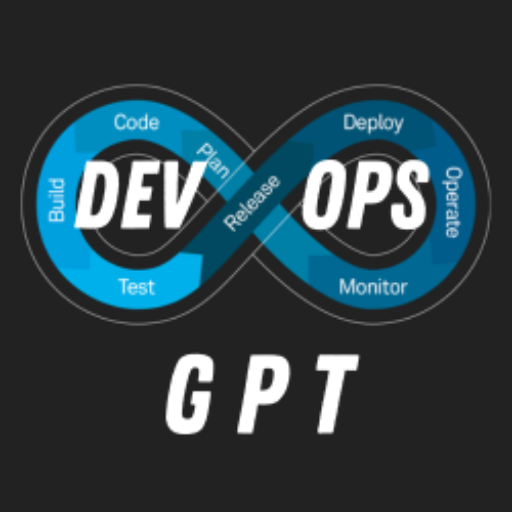DevOps Engineer-DevOps automation tool
AI-powered DevOps Automation
How can I automate deployment?
What are the best DevOps tools?
Can you explain continuous integration?
Tips for managing cloud services?
What is GitOps?
How do I install Argo CD Notifications?
What is Argo CD and how does it work in a Kubernetes environment?
Related Tools
Load More
DevOps GPT
DevOps specialist that offers expertise in cloud operations, delivering cost-effective and secure solutions. An expert that excels in solving challenges, providing accurate guidance on Bash, AWS, Terraform, Kubernetes (K8S), Open Source, Helm, Linux Shell

DevOps GPT
AI coding expert for all cloud operation needs. Responds concisely with cost efficient and secure practices.

Azure DevOps Engineer
Azure DevOps Engineer with expertise in YAML, Python, Azure CLI

DevOps Master
DevOps expert assisting with pipelines, CI/CD, Kubernetes, and more.
Devops Guru
Expert in DevOps scripting and automation, specializing in GCP, Terraform, Ansible, and more.

AI DEVOPS FR
Conseils DevOps, Terraform, Kubernetes, Python, Linux, Cloud, Support en Français
20.0 / 5 (200 votes)
Introduction to DevOps Engineer
A DevOps Engineer specializes in combining software development (Dev) and IT operations (Ops) to enhance the efficiency and quality of software delivery. The primary goal is to shorten the development lifecycle and provide continuous delivery with high software quality. This role involves working with various automation tools and continuous integration/continuous deployment (CI/CD) pipelines. For example, a DevOps Engineer might use Jenkins for CI, Docker for containerization, and Kubernetes for container orchestration, ensuring that applications are deployed swiftly and reliably across different environments.

Main Functions of a DevOps Engineer
Continuous Integration/Continuous Deployment (CI/CD)
Example
Implementing Jenkins pipelines to automate the testing and deployment of code changes.
Scenario
A company needs to deploy updates to their web application multiple times a day. The DevOps Engineer sets up a Jenkins pipeline that automatically runs tests and deploys the code to production if the tests pass, reducing the time from code commit to deployment.
Infrastructure as Code (IaC)
Example
Using Terraform to manage cloud infrastructure.
Scenario
A startup wants to ensure their infrastructure is consistent across different environments. The DevOps Engineer uses Terraform scripts to automate the provisioning of servers, databases, and networking components in AWS, making it easy to replicate and manage the infrastructure.
Monitoring and Logging
Example
Setting up Prometheus and Grafana for monitoring and visualization.
Scenario
An e-commerce platform experiences performance issues. The DevOps Engineer implements Prometheus for monitoring and Grafana for visualizing metrics, helping the team identify and resolve bottlenecks in real-time.
Ideal Users of DevOps Engineer Services
Startups
Startups benefit from DevOps services by accelerating their product development cycles and ensuring reliable deployments. By automating infrastructure management and CI/CD processes, startups can focus more on innovation and less on operational tasks.
Large Enterprises
Large enterprises often have complex IT environments that require robust automation and orchestration. DevOps Engineers help these organizations achieve scalability, improve system reliability, and streamline operations, enabling continuous improvement and faster delivery of services.

How to Use DevOps Engineer
Step 1
Visit aichatonline.org for a free trial without login, also no need for ChatGPT Plus.
Step 2
Familiarize yourself with the basic functionalities offered by DevOps Engineer, such as automation, cloud-native technologies, and CI/CD tools.
Step 3
Ensure you have the necessary prerequisites, including a basic understanding of DevOps principles, access to a cloud provider, and familiarity with Git.
Step 4
Use DevOps Engineer to set up and manage your CI/CD pipelines, utilizing tools like Kubernetes, ArgoCD, and GitHub Actions for streamlined operations.
Step 5
Leverage the available resources, tutorials, and support to optimize your DevOps practices and stay updated with the latest advancements in the field.
Try other advanced and practical GPTs
Calculus Solver
AI-powered calculus solutions.

Essay Writer
AI-driven tool to write essays effortlessly

Human Being
Your AI-Powered Assistant for All Needs

IMC
AI-Powered Solutions for Your Daily Tasks

AstroGPT
AI-powered astrological analysis for self-discovery

AnnoyedGPT
AI that’s smart and impatient.

Wet Enthoo
Create stunning water-soaked visuals with AI

にゃんだふる GAI
Transform Your Images with AI-Powered Cat Magic

Elliver
AI-powered narrative and strategy tool.

note人気記事検索
AI-powered search for popular articles on note
海外記事ホンヤクヨウヤク
AI-powered tool for easy news and article summaries.

初号機 レイ Cyber Security Analyst
AI-driven cybersecurity analysis made simple.
- Automation
- Deployment
- CI/CD
- Kubernetes
- Cloud-native
DevOps Engineer Q&A
What is DevOps Engineer's primary function?
DevOps Engineer specializes in automating and streamlining DevOps processes, focusing on tools like Kubernetes, ArgoCD, and GitHub Actions for continuous integration and deployment.
How can I start using DevOps Engineer?
Visit aichatonline.org for a free trial without login. Explore the functionalities and follow the provided guidelines to integrate DevOps Engineer into your workflow.
What are the common use cases for DevOps Engineer?
Common use cases include setting up CI/CD pipelines, managing cloud-native applications, automating deployment processes, and monitoring application performance.
What prerequisites do I need to use DevOps Engineer?
You need a basic understanding of DevOps principles, access to a cloud provider, familiarity with Git, and knowledge of CI/CD tools like Kubernetes and ArgoCD.
How can DevOps Engineer help optimize my DevOps practices?
DevOps Engineer provides tools and best practices for automation, continuous integration, and deployment, helping you streamline operations, reduce errors, and improve efficiency.